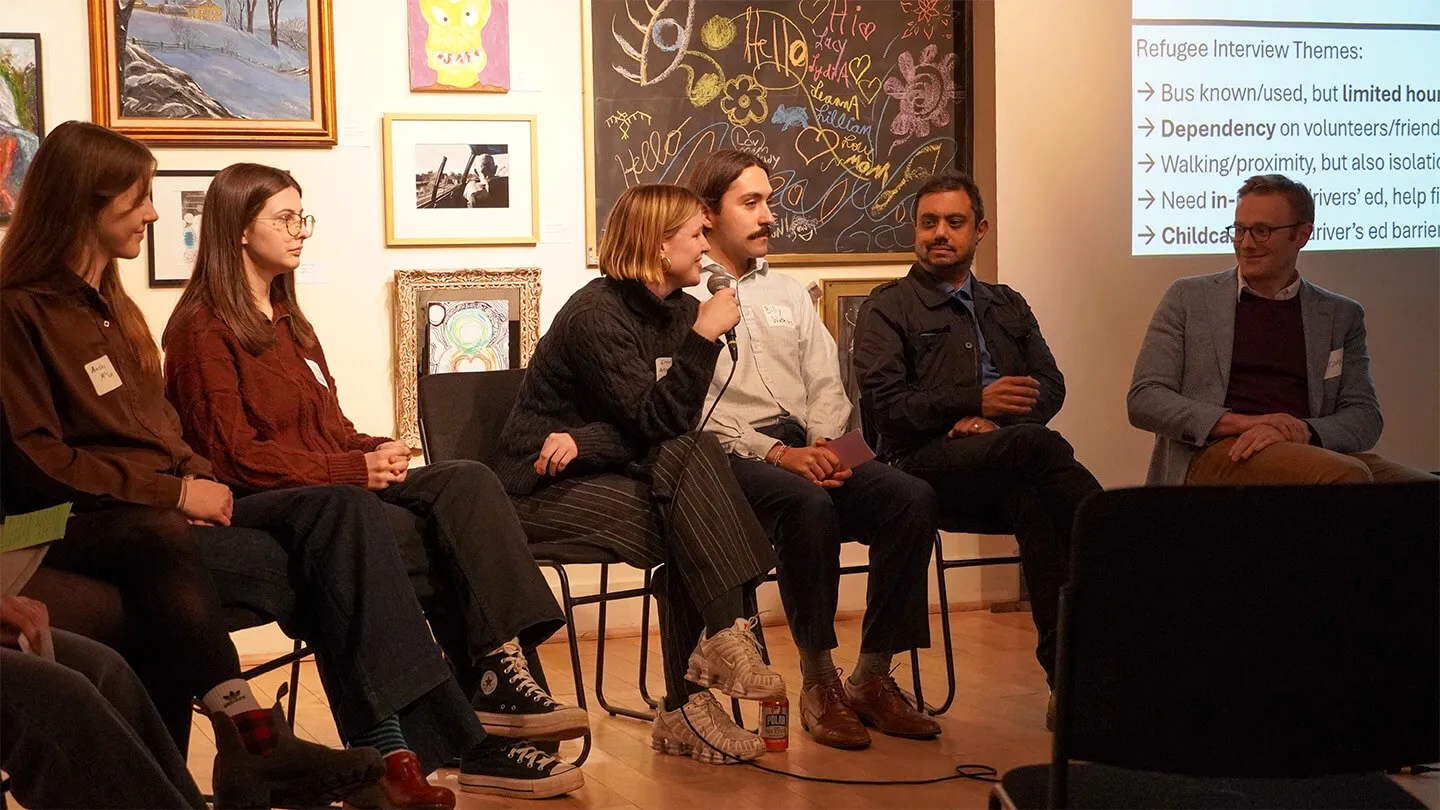Refugees from other countries have been resettling in the Burlington, Vermont area for about 40 years, but beginning in 2021 resettlement has increasingly shifted to more rural areas in the southern part of the state. To better understand the experience of these particular refugee families and look for potential areas of improvement, a group of University of Vermont (UVM) students has been conducting valuable research through the Rural Renewal through Resettlement Program.
The students have been guided by two resettlement experts, Pablo Bose, Ph.D., professor of geography and geosciences and associate dean of research and graduate education at UVM, and Thomas Huddleston, Ph.D., of the Ethiopian Community Development Council (ECDC). Bose, a migration researcher who has been studying resettlement for more than 30 years, describes this student-led project as a collaboration between UVM and three community partners—the ECDC, the Brattleboro Development Credit Corporation, and the School for International Training.
The four organizations had come together a couple years ago to look at the resettlement of displaced people in southern Vermont. At the same time, the Leahy Institute for Rural Partnerships was holding its first grant-making competition, and they were looking for Vermont-based projects that focused on rural development and involved students in the research. The Rural Renewal through Resettlement Program combined these efforts into one project, with the main goal of understanding the process of rural resettlement, its outcomes, what was working, what needed improvement, and how it might differ from resettlement in larger, more urban communities.
This program officially began in May 2024, and by fall of that year, 10 UVM students were working with the three partner organizations. During this research phase, Bose and the students reviewed administrative data from the partners, then traveled repeatedly to Bennington and Brattleboro to interview more than 50 refugee households and over 30 volunteers and sponsors who were working with those households.
Bose says student involvement in the program has been extensive. In addition to conducting the in-person interviews, they’ve written reports and done data visualization and mapping. They’ve also met with program partners to discuss findings, make presentations, and host information panels. Bose and Huddleston have met with the students once a week throughout the project, but Bose emphasizes that it has been mostly student-led.
Students in the program are undergraduates from across the College of Arts and Sciences (CAS), with a few CAS minors from outside the college. “We put them through a pretty rigorous screening and training process,” Bose says. “We get students who are deeply committed, are highly skilled, and have a wide range of interests and backgrounds. Many have done other internships, and a number of them are working with me on more than one project. They are all phenomenal.”
Owen Pickel, a junior majoring in geography with minors in global studies and geospatial technologies, says his role in the project has encompassed a variety of responsibilities. He was drawn to it because of its unique focus as well as the meaningful impact it leaves on rural communities. He says this experience has introduced him to individuals with shared interests, fostering collaboration in a work environment and academic growth. “This will prepare me for life after graduation by giving me the experience beyond the corporate sphere in my desired field, while also deepening my practical applications and skills,” he says.
A senior majoring in sociology and psychology, Muriel Celia says the internship has allowed her to explore the intersection of her majors, doing data collection for health care–related projects as well as engaging with nonprofit social work first-hand. “We also had the exciting opportunity to host an information session for new American students at the School for International Training,” she says. She adds that community-based research in and around the nonprofit sector has opened her eyes to a wide variety of career paths in her field and given her skills and experience to navigate the professional world.
Ainsley McKay, a junior majoring in geography and environmental studies, participated in the initial data collection and fieldwork, conducting and analyzing interviews with resettled refugees in Bennington. “The most memorable part of the experience for me has to be the initial interviews I did,” she says. “I got to talk to 10 different people about being resettled from Afghanistan. I will never forget the way many of them described Bennington as secure and safe for them after fleeing the Taliban in their home country. Hearing about their lived experiences was incredible and really changed my perspective on life in Vermont.”
According to Bose, the project found that, by and large, the refugees were doing pretty well. They reported fairly high levels of satisfaction in their connections with locals and with each other. They weren’t having difficulty finding initial jobs or initial housing. But they did experience some challenges with transportation, longer-term housing, mismatches between educational backgrounds and the jobs available to them, and access to education, among other areas.
Now, in the second year of the project, the Leahy grant has ended, but generous support from a donor is allowing the work to continue. “We are now moving into publishing some of our results as scholarly articles,” Bose says. His team is also working to re-create a study he did in 2008 and 2010 that will take a deeper look at belonging, K–12 education, and health care.
Both this work and the work from the first year of the program will be presented to a study committee for the Vermont Legislature in May of 2026. “One of the things I often emphasize to students is how important it is to be able to translate the work you’re doing in the classroom into a practical setting, whether that’s making policy interventions or advocacy or whatever other kinds of change you can imagine,” Bose says. “So, that’s what we’re focusing on for next year.”
